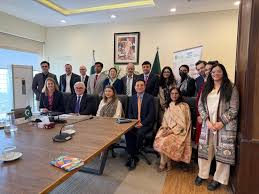Pakistan, Germany strengthen ties to boost carbon market development

Celina Ali
Islamabad: In a significant step toward advancing climate action, prominent government leaders from Pakistan and Germany convened at the Ministry of Climate Change and Environmental Coordination (MoCC&EC) for a high-level bilateral meeting.
The discussions focused on strengthening Pakistan’s carbon market rules and regulations, policies, integrity, and infrastructure, with an emphasis on leveraging climate financing to support the country’s Nationally Determined Contributions (NDCs) under the Paris Agreement.
The meeting, held under the patronage of Secretary (In charge) MoCC&EC, Aisha Humaera, highlighted the critical role of international cooperation in achieving sustainable climate goals.
Humaera expressed her optimism about the technical expertise and capacity-building support provided by the German government, which she believes will help establish robust carbon projects with high environmental integrity.

“We eagerly look forward to Pakistan’s first carbon market transaction and signing bilateral agreements with at least two countries for Article 6 cooperation this year,” she stated, underscoring the ministry’s priority to harness climate financing for sustainable development.
Germany, a global advocate for scaling up carbon markets, has been actively supporting Pakistan through the Supporting Preparedness for Article 6 Cooperation (SPAR6C) program. This initiative, led by the German Federal Ministry for Economic Affairs and Climate Action (BMWK), aims to assist Pakistan in implementing Article 6 of the Paris Agreement, which facilitates international cooperation on carbon markets.
The SPAR6C program, implemented by the Global Green Growth Institute (GGGI) in collaboration with the UNEP Copenhagen Climate Centre and GFA Consulting Group, has been instrumental in developing carbon market guidelines, providing technical reviews, and building institutional capacity in Pakistan.Pakistani cuisine recipes
German Ambassador to Pakistan, Alfred Grannas, emphasized Germany’s commitment to supporting Pakistan in building a high-integrity carbon market. “Through the SPAR6C program, we are strengthening institutional capacity, refining regulatory frameworks, and advancing technical expertise to enhance Pakistan’s preparedness for international carbon transactions,” he said.
Ambassador Grannas also highlighted the potential for market-based climate action to drive long-term emissions reductions and sustainable growth in Pakistan.
The meeting was attended by key stakeholders, including SPAR6C program focal points Ms. Malin Ahlberg and Mr. Thomas Forth from BMWK, GGGI Global Program Manager Mr. Marshall Brown, and UNEP Copenhagen Climate Centre’s Senior Expert Ms. Xianli Zhu. Discussions centered on developing a pipeline of viable carbon market projects, such as the Lakhodair Landfill Project in Punjab, and establishing bilateral agreements for carbon transactions with purchasing countries.
Mr. Thomas Forth, Senior Expert at BMWK, noted that the SPAR6C program lays a strong foundation for attracting investments and scaling up carbon finance in Pakistan. “This collaboration positions Pakistan to effectively leverage market-based solutions for sustainable growth,” he said.
Ms. Xianli Zhu of UNEP-CCC highlighted the program’s efforts to foster a conducive environment for carbon market development through toolboxes, guides, sectoral reports, and mentorship programs.
Meanwhile, Mr. Marshall Brown of GGGI reiterated the organization’s commitment to supporting Pakistan across the full spectrum of carbon market implementation, from readiness under SPAR6C to facilitating bilateral cooperation through the Carbon Transaction Facility.
The visit of the German delegation also includes a series of strategic and technical discussions with Pakistani private and government institutions at the federal and provincial levels. These meetings aim to increase awareness of opportunities under Article 6 and the SPAR6C program, while deliberating on interprovincial coordination and strategic priorities for carbon market implementation.





